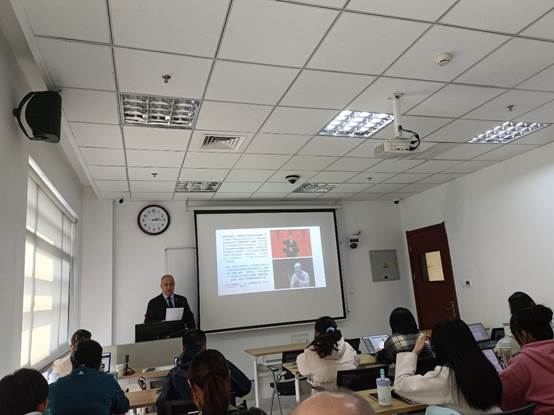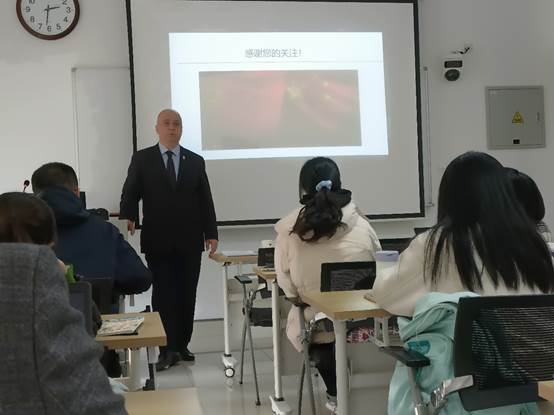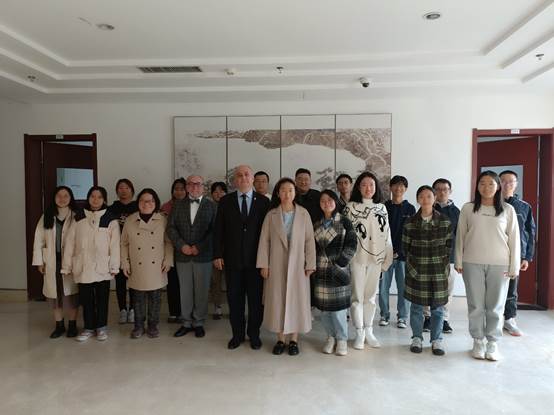On the afternoon of November 15, Andey AGOSHKOV, a senior researcher from the Institute of Socio-Political Research of the Russian Academy of Sciences, was invited by Prof. ZHOU Lu from the Institute of Russian Language and Culture to deliver a lecture titled “E-Commerce Customs in Russia and China under the Lens of Law and Anthropology”. The lecture was moderated by Prof. ZHOU Lu.
The lecture began with Mr. AGOSHKOV outlining the current scale and development models of the e-commerce market in China and Russia. He underscored China's unique position in global e-commerce. In 2018, China’s online retail sales reached approximately US$1.33 trillion; in 2019, China’s e-commerce sales accounted for 55.8% of the global online retail market. The Chinese e-commerce market has become a flagship in the industry, distinguished by its immense scale and diverse, comprehensive development models. In contrast, Russia’s e-commerce is still in a relatively moderate development phase but shows promising growth prospects.

Both China and Russia have legal regulations regarding e-commerce. In Russia, applicable laws mainly include the “Уголовный кодекс Российской Федерации” (Criminal Code of the Russian Federation), Federal Law on Advertising, and Federal Consumer Rights Protection Law. China is also becoming increasingly robust in its legal framework, the most authoritative being the E-Commerce Law of the People’s Republic of China, which came into effect in 2019.
Beyond written laws and regulations, e-commerce practices are also governed by conventional norms. Mr. AGOSHKOV used mediation procedures as an example to compare and analyze the differing attitudes towards legal customs in China and Russia from legal and anthropological perspectives. Mediation procedures have not been fully developed in the Russian Federation mainly due to the lack of legal information and public legal education. In China, mediation enjoys an even higher official status as it is regulated by the Constitution of the People’s Republic of China.
Mr. AGOSHKOV then illustrated the specific impact of language and cultural differences on Sino-Russian trade using the common Chinese phrase “差不多” (chabuduo, roughly meaning “almost” or “good enough”). Language barriers increase the cost and potential errors in communication. While Chinese merchants tend to use phrase “差不多” (chabuduo) to describe products, reflecting a traditional preference for the overall picture over minute details, this can also hinder actual trade.
Finally, Mr. AGOSHKOV emphasized the significant role that traditional Chinese philosophy has played in resolving commercial disputes and fostering an ethical business environment. He mentioned that President XI Jinping frequently cited the sayings of Confucius in his speeches, e.g., “A gentleman seeks harmony but not conformity; the benevolent work towards agreement while respecting diversity”. Such quotes demonstrate President XI’s regard for Confucius not just as a historical figure, but as a “mentor for all ages”. Mr. AGOSHKOV asserted that the study and application of Confucian philosophy in e-commerce, especially in mediation processes, is conducive to avoiding the risk of litigation in resolving business conflicts.

The topic of e-commerce is urgent as it is a robust part of modern economy. Mr. AGOSHKOV’s lecture broadened the academic horizons of the students and teachers, sparking keen interest. Following the lecture, students engaged in a lively Q&A session, to which Mr. AGOSHKOV gave insightful answers. The event concluded in a friendly and successful atmosphere.

Translated by CHEN Fanjia and HAN Zhuojun, Proofread by XU Xueying



